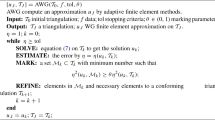Abstract
This paper is devoted to the convergence and optimality analysis of the adaptive Morley element method for the fourth order elliptic problem. A new technique is developed to establish a quasi-orthogonality which is crucial for the convergence analysis of the adaptive nonconforming method. By introducing a new parameter-dependent error estimator and further establishing a discrete reliability property, sharp convergence and optimality estimates are then fully proved for the fourth order elliptic problem.
Similar content being viewed by others
References
Ainsworth M., Rankin R.: Robust a posteriori error estimation for the nonconforming Fortin-Soulie finite-element approximation. Math. Comput. 77, 1917–1939 (2008)
Babuska I., Rheinboldt W.C.: Error estimates for adaptive finite element computations. SIAM. J. Numer. Anal. 15, 736–754 (1978)
da Veiga L.B., Niiranen J., Stenberg R.: A posteriori error estimates for the Morley plate bending element. Numer. Math. 106, 165–179 (2007)
Binev P., Dahmen W., DeVore R., Petrushev P.: Approximation classes for adaptive methods. Serdica Math. J. 28, 391–416 (2002)
Binev P., DeVore R.: Fast computation in adaptive tree approximation. Numer. Math. 97, 193–217 (2004)
Binev P., Dahmen W., DeVore R.: Adaptive finite-element methods with convergence rate. Numer. Math. 97, 219–268 (2004)
Brenner S., Scott L.R.: The Mathematical Theory of Finite Element Methods. Springer, New York (1994)
Brenner S.C., Sung L.-Y.: C 0 interior penalty methods for fourth order elliptic boundary value problems on polygonal domains. J. Sci. Comput. 22(23), 83–118 (2005)
Carstensen C.: A unifying theory of a posteriori finite element error control. Numer. Math. 100, 617–637 (2005)
Carstensen C., Bartels S., Jansche S.: A posteriori error estimates for nonconforming finite-element methods. Numer. Math. 92, 233–256 (2002)
Carstensen C., Hu J.: A unifying theory of a posteriori error control for nonconforming finite-element methods. Numer. Math. 107, 473–502 (2007)
Carstensen C., Hu J., Orlando A.: Framework for the a posteriori error analysis of nonconforming finite elements. SIAM. J. Numer. Anal. 45, 68–82 (2007)
Carstensen C., Hoppe R.H.W.: Convergence analysis of an adaptive nonconforming finite-element method. Numer. Math. 103, 251–266 (2006)
Cascon J. Manuel, Kreuzer C., Nochetto R.H., Siebert K.G.: Quasi-optimal convergence rate for an adaptive finite-element method. SIAM J. Numer. Anal. 46, 2524–2550 (2008)
Chen L., Holst M., Xu J.: Convergence and optimality of adaptive mixed finite-element methods. Math. Comput. 78, 35–53 (2008)
Ciarlet, P.G.: The Finite Element Method for Elliptic Problems. North–Holland, 1978; reprinted as SIAM Classics in Applied Mathematics (2002)
Dari E., Duran R., Padra C.: Error estimators for nonconforming finite-element approximations of the Stokes problem. Math. Comput. 64, 1017–1033 (1995)
Dari E., Duran R., Padra C., Vampa V.: A posteriori error estimators for nonconforming finite- element methods. Math. Model. Numer. Anal. 30, 385–400 (1996)
Dörfler W.: A convergent adaptive algorithm for Poisson’s equation. SIAM J. Numer. Anal. 33, 1106–1124 (1996)
Gudi T.: A new error analysis for discontinous finite element methods for linear problems. Math. Comput. 79, 2169–2189 (2010)
Hu J., Shi Z.C.: A new a posteriori error estimate for the Morley element. Numer. Math. 112, 25–40 (2009)
Hu, J., Shi, Z.C., Xu, J.C.: Convergence and optimality of adaptive nonconforming methods for high-order differential equations, Research Report 19. School of Mathematical Sciences and Institute of Mathematics, Peking University (2009)
Hu, J., Xu, J.C.: Convergence of Adaptive Conforming and Nonconforming Finite Element Methods for the Perturbed Stokes Equation, Research Report 73. School of Mathematical Sciences and Institute of Mathematics, Peking University. http://www.math.pku.edu.cn:8000/var/preprint/7297.pdf (2007)
Marini L.: An inexpensive method for the evaluation of the solution of the lowest order Raviart–Thomas mixed method. SIAM J. Numer. Anal. 22, 493–496 (1985)
Morley L.S.D.: The triangular equilibrium element in the solutions of plate bending problem. Aero. Q. 19, 149–169 (1968)
Morin P., Nochetto R., Siebert K.: Data oscillation and convergence of adaptive FEM. SIAM J. Numer. Anal. 38, 466–488 (2000)
Morin P., Nochetto R.H., Siebert K.G.: Convergence of adaptive finite-element methods. SIAM Rev. 44, 631–658 (2002)
Shi Z.C.: Error estimates for the Morley element. Chin. J. Numer. Math. Appl. 12, 102–108 (1990)
Stevenson R.: Optimality of a standard adaptive finite element method. Found. Comput. Math. 7, 245–269 (2007)
Stevenson R.: The completion of locally refined simplicial partitions created by bisection. Math.Comput. 77, 227–241 (2007)
Verfürth R.: A Review of a Posteriori Error Estimation and Adaptive Mesh-Refinement Technique. Wiley-Teubner, New York (1996)
Wang, M., Zhang, S.: Local a priori and a posteriori error estimates of finite-elements for biharmonic equation. Research Report 13. School of Mathematical Sciences and Institute of Mathematics, Peking University (2006)
Wang, M., Xu, J.C.: Minimal finite-element spaces for 2m-th order partial differential equations in R n. Research Report 29. School of Mathematical Sciences and Institute of Mathematics, Peking University (submitted to Mathematics of Computation) (2006)
Xu J.C.: Iterative methods by space secomposition and subspace correction. SIAM Rev. 34, 581–613 (1992)
Author information
Authors and Affiliations
Corresponding author
Additional information
The first author was supported in part by the NSFC Key Project 11031006 under Grant 10971005, and Foundation for the Author of National Excellent Doctoral Dissertation of PR China 200718, and partially supported by the Chinesisch-Deutsches Zentrum project GZ578. The third author was supported in part by NSF 0915153 and NSFC-10528102.
Rights and permissions
About this article
Cite this article
Hu, J., Shi, Z. & Xu, J. Convergence and optimality of the adaptive Morley element method. Numer. Math. 121, 731–752 (2012). https://doi.org/10.1007/s00211-012-0445-0
Received:
Revised:
Published:
Issue Date:
DOI: https://doi.org/10.1007/s00211-012-0445-0




